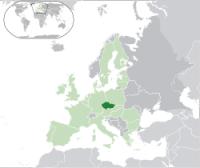|
|
|
The Czech Republic (c-enaudio=en-us-Czech Republic.oggˈtʃɛk ; , -csˈtʃɛskaː ˈrɛpuˌblɪkapronCeska Republika is a landlocked country in Central Europe. The country is bordered by Poland to the northeast, Slovakia to the east, Austria to the south, and Germany to the west and northwest. It is a pluralist multi-party parliamentary representative democracy, a member of the European Union, NATO, the OECD, the OSCE, the Council of Europe and the Visegrád Group. The Czech state, formerly known as Bohemia, was formed in the late 9th century as a small duchy around Prague, at that time under dominance of the powerful Great Moravian Empire (which reached its greatest territorial extent during the reign of Svatopluk I from the House of Mojmír). After the fall of the Empire in 907, the centre of power was transferred from Moravia to Bohemia, under the Přemyslids. During the rule of Přemyslid dukes/kings and their successors, the Luxembourgs, the country reached its greatest territorial extent (13th � 14th century). Life in the country was significantly affected by the Hussite wars, during which it faced economic embargo and crusades from all over Europe. Following the Battle of Mohács in 1526, the Crown of Bohemia was gradually integrated into the Habsburg monarchy as one of its three principal parts alongside the Archduchy of Austria and the Kingdom of Hungary. The Bohemian Revolt (1618 � 20) led to the further centralization of the monarchy including forced recatholization and Germanization. During radical reforms in the 18th century the Bohemian Crown was even de facto abolished (1749). In the 19th century the Czech lands became the industrial powerhouse of the monarchy and the core of the Republic of Czechoslovakia which was formed in 1918, following the collapse of the Austro-Hungarian empire after World War I. After the Munich Agreement, Polish annexation of Zaolzie and German occupation of Czechoslovakia and the consequent disillusion with the Western response and gratitude for the liberation of the major portion of Czechoslovakia by the Red Army, the Communist Party of Czechoslovakia won the plurality in the 1946 elections. In a 1948 coup d'état, Czechoslovakia became a communist-ruled state. In 1968, the increasing dissatisfaction culminated in attempts to reform the communist regime. The events, known as the Prague Spring of 1968, ended with an invasion by the armies of the Warsaw Pact countries (with the exception of Romania); the troops remained in the country until the 1989 Velvet Revolution, when the communist regime collapsed. On 1 January 1993, Czechoslovakia peacefully dissolved into its constituent states, the Czech Republic and the Slovak Republic. The Czech Republic is the first former member of the Comecon to achieve the status of a developed country according to the World Bank. In addition, the country has the highest human development in Central and Eastern Europe, ranking as a "Very High Human Development" nation. It is also ranked as the third most peaceful country in Europe and most democratic and healthy (by infant mortality) country in the region. |




 RSS
RSS